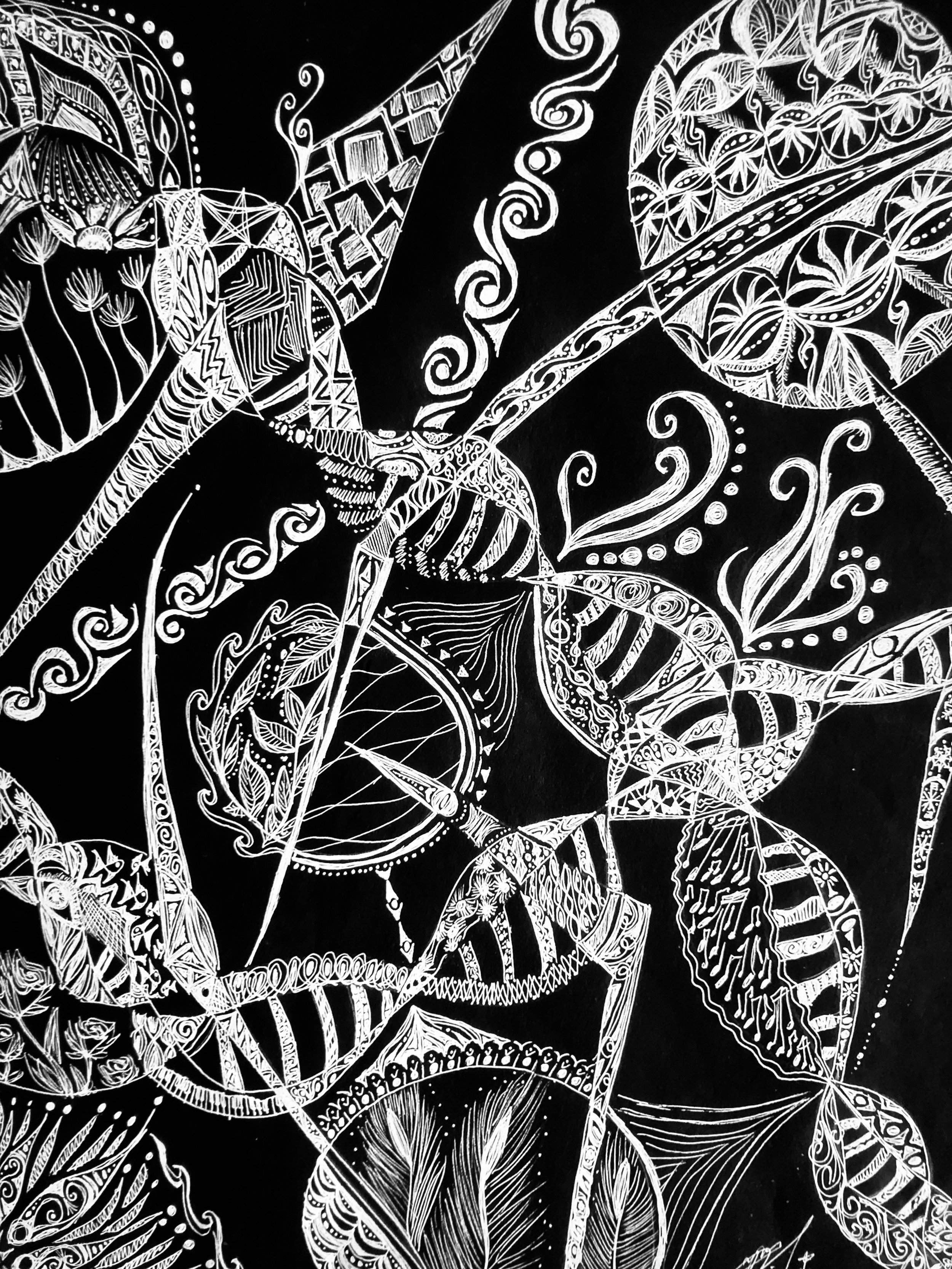Diasporic daydreams
*NOTE: Why am I posting my journal entries? See my inaugural post: Beyond journalism
(*artwork by Incé Husain)
I’m exhausted today. No matter. I had dealt with it peacefully last night.
I’d tossed and turned. I’d wandered downstairs in the dark. The cold tiles were soothing. I relished my house by the fields and forest, my “farmhouse”, its sanctuary, its isolation.
I cut a thread for tatreez. I spread myself out on the couch; the fabric’s scent, in the house’s night air, was somehow distinctly of Pakistan.
X said on the phone “Pakistan is a memory; I don’t yearn for it”.
I do yearn for it.
I was lush and liberated there. I could not stagnate no matter what I did. Even stagnation could not thrive when I sat next to the window and listened to the raging city. Chaos is unavoidable; there is no refuge, no insulation; order is a guideline, not a fact. It kept me young and open.
Here, my life is the tunnel vision of a house, a bus, a building. Anything beyond it is an abstraction to the point of nothingness. I’m claustrophobic.
There, I pulsed.
I pulsed with dimension, vibrancy, calm, power, conviction, emotion, and unbridled love. Even in my insomnia, I was in a supernatural space. I was never alone. I was constantly jarred out of dullness or stagnancy by birds, cats, trees, visitors, the city; my vigilance was strong, my spontaneity inevitable. I was constantly novel and fresh. It is no mistake, I think, that my novella, in its final glory, was born in Lahore. This city mended the breaks in my mind and heart that opened and widened with every step I took in Fredericton, in London, in any small, predictable, homogenous city.
***
I yearned for every annual trip. The plane would land at 4a.m. I would emerge, and be immediately wrapped in curtains of fog and chaos. Massive crowds shouting names of the recently landed; rose petals thrown across pavement; amber streetlights toying with the fog and cutting everyone to shadows and limbs; stray cats wandering the airport; birdsong beginning to erupt; heat rising as the sun climbed the horizon; the call to prayer buzzing. And the heavy air - full of smog, sweetness, and moisture.
Life is not uniform here. The elite, the wealthy, the working class, the beggars - we entangle. That is the standard. I am thrown into oblivion.
I look the part. My black hair, my dark skin, my clothes. I am not questioned; I am overlooked. I revel in this sameness. Pakistan has always reverberated in me, literally. It feels like home.
But all this is tinted.
I leave the airport to a luxurious family home.
I don’t drive; our family chauffeur does, and he also loads the car with my bags. I sit in the backseat and watch the trees and the fog and the dusty roads, dozing off to the hum of traffic.
I am greeted by family when I buzz the doorbell at 5a.m. I wake up when I please, jetlag-infused.
I ask the maid to iron my clothes. I ask the cook to make me pasta.
I leave the house in a cloak of privilege, always accompanied by family who know the streets. I attend parties at home; I attend lush weddings out; I’m lathered in silk, French chiffon, jewels. I socialize with guests. They make space for me easily; I carry, by blood, my maternal family’s status. There are always people coming in and out of the house.
I teach the maids how to read; I play with the cook’s daughter; I get my hair done, my feet done, my hands done. I mine my grandfather’s massive library and read books, emerging when I am called to outings to a restaurant, a marketplace, the cinema. To prayer.
One year, I work at the psychiatry ward. I observe, listen, tame my nerves, learn my nerves. I will never forget these faces: patients, doctors, what they all tried to do in the small room with the rickety fan, the two chairs and the desk. The fluorescent pills and the calculated, therapeutic words meant to identify and recalibrate. We spend hours here. Then we fall back, anonymous, into the chaos of the sweltering city.
I tell my parents I love this place, I’m Pakistani, I want to build a life for myself here.
On kind days, they say “you have a romanticized view of Pakistan. You live a luxurious life there. You don’t know the streets, the society, the norms. You don’t know how hard it would be for you to actually live here.”
On less kind days, they say “you’re not really Pakistani. You just go there for six weeks a year. You don’t know anything.”
And people who don’t know me in Pakistan come to learn this. I don’t stay blended for long. They can smell it on me. My accent, my mannerisms, my overeager eyes. It just takes longer for me to be recognized as not quite from here.
I try to be Pakistani. I speak Urdu. Roll my r’s, my k’s, my n’s. I touch up each tune. Listen to songs, shows. I read about the great writers. To no avail, really. I am Pakistani to Pakistanis until they realize I am not quite Pakistani - and I become something foreign with the right skin. No longer is my nostalgia for home considered legitimate - it’s something else, a cross between tourism and identity theft.
***
My grandparents survived partition. From both sides of my family. From both sides of the partition line.
Was I there, in my maternal grandmother’s body? Did my mother, a half-formed egg cell in my grandmother’s stomach, bear the imprint of partition? Did this imprint touch me, nearly eighty years later?
My body feels loaded. I feel that I inherited it. The scientific literature is undecided. ♦
